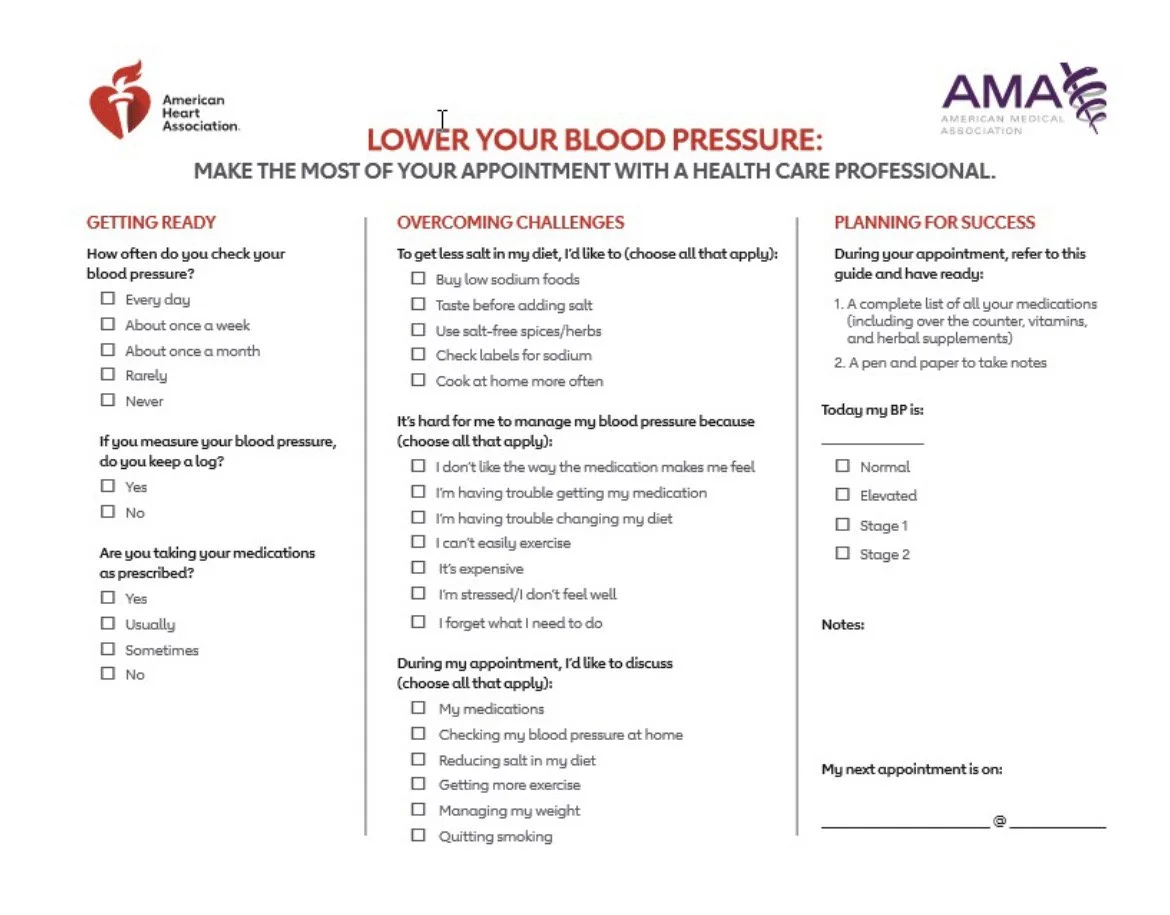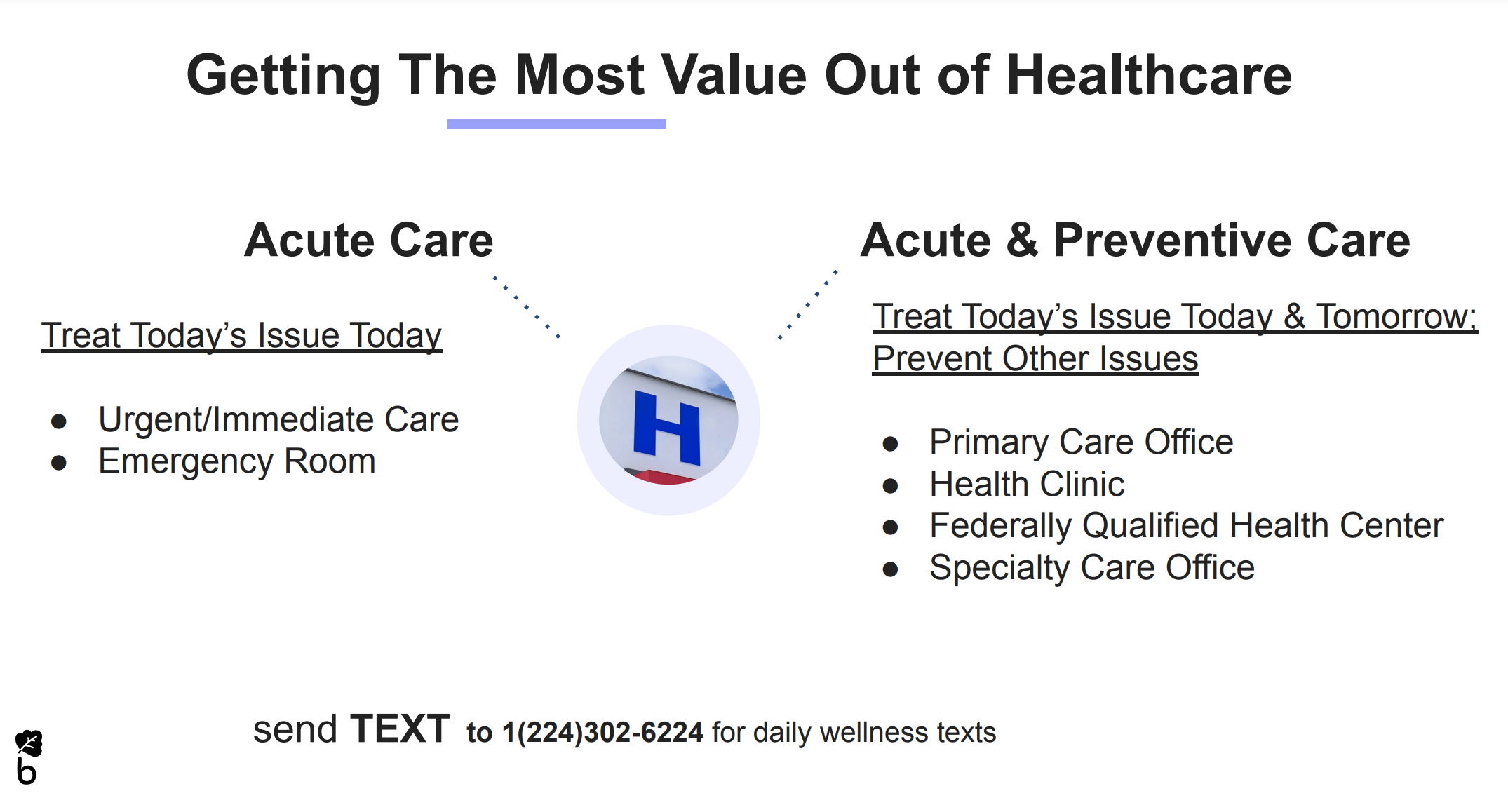Go To The Doctor
Hi Byte Wellness Family,
We made it to DECEMBER! It’s been a long year, but we’re in the last month! Good work and thanks to the powers that be.
Should I See a Doctor?
In the Daily Wellness Text Thread this week, we talked about healthcare’s role in wellness. That’s right… doctor’s visits are an important part of wellness advocacy and self-care. I know some of you will have questions about when to see a doctor. We dove into why that is in the #ByteWellnessWednesday workshop video that we texted to members. In light of very justified medical mistrust, we reiterated that going to the doctor is incredibly important. But, as much as possible, you should go to a doctor you can trust. Get more discussion in the text thread my sending TEXT to 1(224)302-6224 or clicking here.
Let’s get to the discussion questions for this week.
Discussion Questions for This Week:
Think about visiting a doctor. What are the 1st feelings that come up? Relief? Anxiety?
What beliefs or prior experiences support the feeling you just named?
Not all of us feel anxious about seeing doctors. But, we’re all probably familiar with “medical mistrust”, that reluctance to see a doctor or engage with healthcare institutions because you don’t really trust that they’ll act in your best interest. Whether you’ve had that feeling or you’ve heard from family of friends who share the feeling, you probably know it’s legitimate. For many of us, this mistrust of medical institutions is linked to experiences we’ve had in healthcare settings where it seemed that we were discriminated against. The topic has been well-studied by researchers.
from the American Heart Association: https://states.aarp.org/florida/tool-help-navigate-complex-healthcare-system
Reasons to Go to The Doctor
There are plenty of reasons for going to the doctor. Essentially, having a relationship with a primary care provider that you can see on a regular basis sets you up to prevent future health problems:
Chronic Disease Screenings
Cancer Screenings
Age-Related and Disease-Related Vaccines
For example, getting your blood pressure and blood sugar screened by your primary care provider helps you detect chronic diseases like type 2 diabetes and high blood pressure in the early stages, so you and your doctor can work together to keep you from ever experiencing the late-stage consequences like stroke, heart attack and kidney failure.
Another way primary care providers help you prevent future health problems is by screening you for cancers. Especially relevant for our members are the pap smear (to detect cervical cancer), and the mammogram (to detect breast cancer).
Last, but not least, your primary care provider will recommend when you should get vaccinated against harmful conditions like shingles, flu or strep pneumonia.
So, if you never see a doctor or you get most of your care from an ER or urgent care when you have an urgent problem, you run the risk of missing out on all the preventive care we just mentioned (screenings and vaccines). That’s because those services simply aren’t part of the urgent care evaluation. Keep all of these realities in mind when you’re deciding when to go to the doctor.
You can get the most value out of the healthcare system by spending most of your doctor time with primary care doctors and specialists (not in Emergency rooms, urgent care clinics or immediate care sites). That means, in the image down below, you should spend most of your time on the RIGHT side, not the left.
When Should I Go to The Doctor With A Broken Toe?
That’s a trick question because how could you know it’s broken without seeing the doctor? Another benefit of having a relationship with a primary care provider is that you can call them to ask questions! That way, you can make smart decisions about when to go to the doctor or stay home.
If you’ve ever fallen at home and dealt with unbearable pain, wondering “when should I go to the doctor for tailbone pain?”, or “when should I go to the doctor for a sprained ankle?”. Maybe you have common cold symptoms that won’t go away (you know, that feeling of mucus pooling in your throat), and you wonder what should you do. Maybe you’ve even been diagnosed with COVID-19, and you were discharged from the ER or immediate care because you’re breathing well enough to be safe at home. Still, you need information on how to treat covid at home, and Dr. Google isn’t helping.
Here’s where having a relationship with a primary care doctor comes in handy. If you’ve seen your provider at least once before in the last few years, guess what…you can CALL them and get some answers. Their office staff or clinic staff should ask you questions about your symptoms and your concerns, then give you advice.
They’ll advise you whether to make an appointment to see your primary care provider or to go directly to the emergency room or an urgent care clinic. If your symptoms sound mild enough, maybe they’ll even suggest you stay home, try some home remedies, and call them back within a day or two if you’re not feeling better.
The point is, your primary care provider’s office or clinic is your medical home. You should feel safe checking in whenever you need help. And those check-ins can save you the time and money of an unnecessary trip to the emergency room.
Okay, so we’ve established that you’re better off seeing a doctor when you have an urgent issue AND when you need preventive care.
We’ll talk next week about how often to ask for certain preventive screenings.
Meanwhile, keep sending me your questions and comments. Post in the comments, or send me an email or a text.
Happy Healthy Living,
Dr. Wuse



